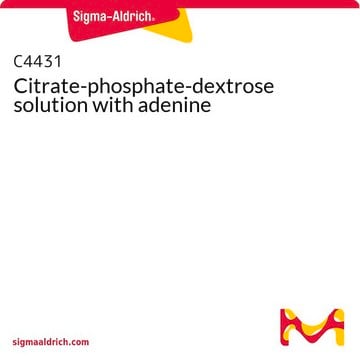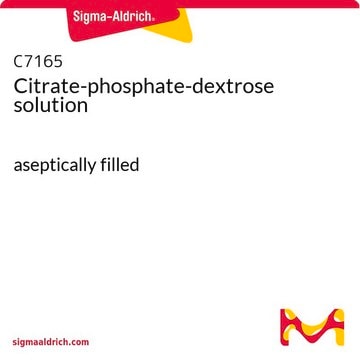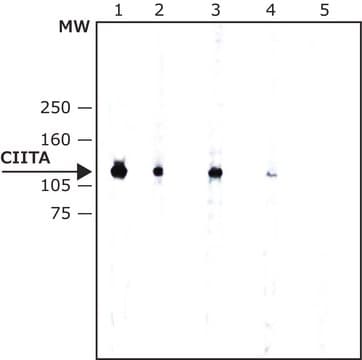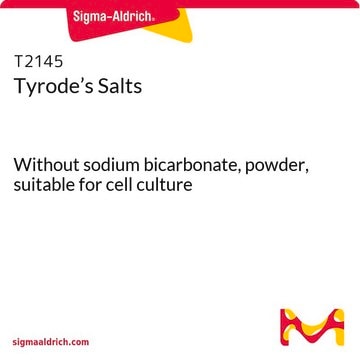C3821
Citrate-dextrose solution (ACD)
sterile-filtered
Synonym(s):
Acid citrate-dextrose, Anticoagulant citrate-dextrose
Sign Into View Organizational & Contract Pricing
All Photos(1)
About This Item
Recommended Products
General description
Citrate-dextrose solution (ACD) is an anticoagulant and preservative used routinely for blood storage. The ideal red blood cells shelf life is 21 days when stored in ACD solution. Red blood cells in ACD solution utilize glucose and their viability is impairs when reinfused.
Application
Citrate-dextrose solution (ACD) has been used for dilution of blood for haematological studies. It has also been used as an anticoagulant during blood collection by cardiac puncture from mice and human bone marrow isolation.
For research use only. Not for use in diagnostic procedures.
Biochem/physiol Actions
Useful for anticoagulation of whole blood; erythrocyte survival
related product
Product No.
Description
Pricing
Storage Class Code
12 - Non Combustible Liquids
WGK
WGK 1
Flash Point(F)
Not applicable
Flash Point(C)
Not applicable
Personal Protective Equipment
dust mask type N95 (US), Eyeshields, Gloves
Certificates of Analysis (COA)
Search for Certificates of Analysis (COA) by entering the products Lot/Batch Number. Lot and Batch Numbers can be found on a product’s label following the words ‘Lot’ or ‘Batch’.
Already Own This Product?
Find documentation for the products that you have recently purchased in the Document Library.
Customers Also Viewed
Mingming Yang et al.
Experimental and therapeutic medicine, 20(2), 1253-1260 (2020-08-09)
The p53 gene is well known as a key tumor suppressor gene; it is vital for hematopoietic stem cell differentiation and growth. In the present study, the change of platelets (PLTs) in p53 knockout mice (p53-/- mice) was investigated. The
Isolation, expansion and characterisation of mesenchymal stem cells from human bone marrow, adipose tissue, umbilical cord blood and matrix: a comparative study
Secunda R, et al.
Cytotechnology, 67(5), 793-807 (2015)
Comparison of equine platelet function and survival in whole blood collected in acid-citrate-dextrose solution or citrate-phosphate-dextrose-adenine solution
Bozorgmanesh R, et al.
Veterinary Clinical Pathology / American Society For Veterinary Clinical Pathology, 46(2), 262-268 (2017)
Interaction between FOG-1 and the corepressor C-terminal binding protein is dispensable for normal erythropoiesis in vivo
Katz SG, et al.
Molecular and Cellular Biology, 22(9), 3121-3128 (2002)
Bumduuren Tuvshintulga et al.
The Journal of infectious diseases, 222(6), 1027-1036 (2020-04-21)
Persistent and relapsing babesiosis caused by Babesia microti often occurs in immunocompromised patients, and has been associated with resistance to antimicrobial agents such as atovaquone. Given the rising incidence of babesiosis in the United States, novel drugs are urgently needed.
Our team of scientists has experience in all areas of research including Life Science, Material Science, Chemical Synthesis, Chromatography, Analytical and many others.
Contact Technical Service












